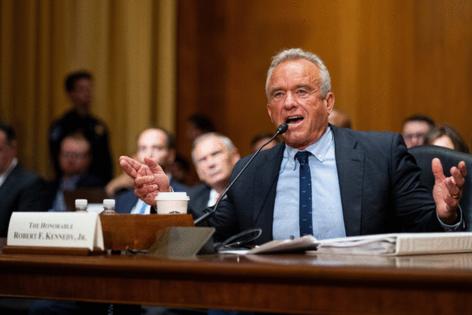Trump health report avoids crackdowns on food, agriculture
Published in News & Features
A highly anticipated health report from the Trump administration steered clear of new crackdowns on food and agriculture — drawing criticism from some groups that are calling for an overhaul of how pesticides are used.
The report, written by a slew of federal agencies and billed as a policy roadmap, will likely ease months of speculation and angst from corporations that were concerned about costly new policies related to processed ingredients and chemicals.
Although food and agriculture companies have been frequent targets of the administration, they’ve largely avoided the dramatic changes that Health Secretary Robert F. Kennedy Jr. has unleashed within the health sphere, where he wields more control.
“For the most part, the final MAHA report issued today will bring a collective sigh of relief in food industry boardrooms,” wrote Peter Lurie, president of the Center for Science in the Public Interest, a nonprofit consumer advocacy group. He added the report “leans heavily in the direction of government deregulation, voluntary corporate action and research likely to be decimated under the president’s proposed budget.”
Remaining uncertainties for companies include the development of a new definition for ultra-processed food, the overhaul of dietary guidelines and efforts to bolster the U.S. food supply. The administration is also looking to improve standards for infant formula while exploring the development of limits on direct advertising of unhealthy foods to children, among other measures.
The final report, made public Tuesday, was similar to a draft version that was circulated in mid-August, and its release comes nearly a month after it was initially due to be submitted to the president.
‘Deeply disappointed’
The omission of specific pesticides, such as glyphosate, which are seen as particularly harmful, “is a glaring example of chemical-company influence on this report,” said Zen Honeycutt, the executive director of the nonprofit Moms Across America, in comments to reporters following the unveiling of the report at an event in Washington. “We’re deeply dismayed by the continued corruption and influence of foreign chemical companies.”
Honeycutt’s group has been a vocal supporter of Kennedy’s efforts to promote less-processed foods and crack down on pesticides.
“After all of Kennedy’s bluster about reforming our unhealthy, destructive food system, this resembles a last-minute book report more than a strategic path forward,” according to Leah Kelly, food and agriculture policy specialist at the Center for Biological Diversity, an environmentally focused nonprofit group.
In contrast, the head of the National Corn Growers Association, Kenneth Hartman Jr., said the policy recommendations “appear to be a reasonable and science-based approach for achieving its objectives.” American Farm Bureau Federation President Zippy Duvall said, “We appreciate the report’s recognition of the vital role farmers play in the food supply chain.”
The report also calls on federal agencies to work with restaurants to “increase education and awareness” of healthy food options for children. The policy roadmap proposes evaluating the health effects of pesticides, but takes no immediate steps to curb the use of glyphosate, the active ingredient in Roundup weedkiller, which has been a key focus of the so-called Make America Healthy Again movement.
Kennedy’s efforts to change U.S. food and agricultural policy must navigate the influence of the Department of Agriculture and its secretary, Brooke Rollins, according to David Mansdoerfer, a former health official who served during the first Trump administration.
“He has to work hand in hand with Secretary Rollins and that probably is a little bit of a moderating voice around that topic,” he said, in comparison to what Kennedy can do on his own at HHS.
At Tuesday’s event, Rollins defended the use of pesticides common in U.S. agriculture, saying there’s a strict review process and any new product used by farmers “will have gone through years upon years upon years of research.”
Whole milk
The final report maintained parts of an earlier draft suggesting an education campaign to boost fertility rates and an initiative to return whole milk to public schools. It also kept a plan to give Americans receiving food stamps so-called “MAHA Boxes” of produce and “whole, healthy” food.
It’s the second installment in a two-part process to carry out an executive order Trump signed in February. The first report spelled out what the administration viewed as the root cause of chronic disease among children, while Tuesday’s report is intended to lay out policies to address those root causes.
The first report was plagued by inaccurate footnotes citing studies that in some cases didn’t exist. The latest document doesn’t contain any citations.
_____
©2025 Bloomberg L.P. Visit bloomberg.com. Distributed by Tribune Content Agency, LLC.







Comments